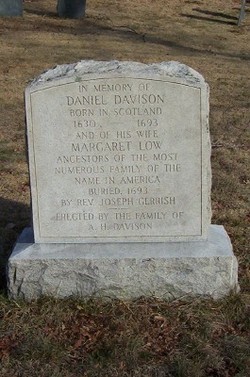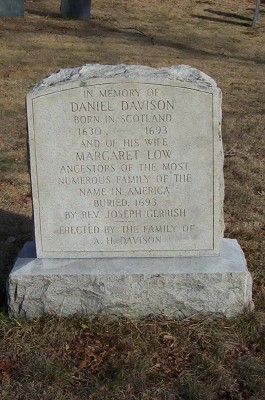The placing of Daniel as one of the Scotch exiles was in the instance largely upon circumstantial evidence, and family traditions. Wehn this solution was once accepted, it was found so well secured in circumstances that it seemed impossible to rove a flaw of genuineness of the same. The traditions, while indistinct as to the historical facts, were founded in lines of the family descent, and had been separated for two centuries, and could have only a common source at the beginning. Daniel Davison being an industrious, frugal thinking man under the conditions named in Rev. John Cotton's letter, soon found himself able to reimburse the person who paid for his passage to America and in the short period of six years accumulated enough substance to become a farmer upon his own account, and married into a substantial English family, that was a borne a worthy name through the centuries since. His children were able to make marriage alliance with the best families, the Dodges, the Whipples, the Morgans, the Tracys, the Williams, and the Reddingtons who took and maintained, during the eight to ten generations since, leaving good repute thoughtout the continent. He was an educated man to any degree. The record indicates he did not write. If by any chance, he was taken into the Scotch army on the levy of 1643, he could have had the oppurtunity for education. While it seems improbable at this time, that a boy of fourteen years would be called, yet in the Revolutionary War, Benjamin Davison, who enlisted at fourteen year of age, and fought in the lines for eight years, was only one of Several of Daniel Davison's descendants of similar ages, who fought to make this nation possible.
Daniel Davison was a member of the Convenanter Army stands as the strongest evidence that his people were of that faith, and that he was baptized as a child in Scotland.
The placing of Daniel as one of the Scotch exiles was in the instance largely upon circumstantial evidence, and family traditions. Wehn this solution was once accepted, it was found so well secured in circumstances that it seemed impossible to rove a flaw of genuineness of the same. The traditions, while indistinct as to the historical facts, were founded in lines of the family descent, and had been separated for two centuries, and could have only a common source at the beginning. Daniel Davison being an industrious, frugal thinking man under the conditions named in Rev. John Cotton's letter, soon found himself able to reimburse the person who paid for his passage to America and in the short period of six years accumulated enough substance to become a farmer upon his own account, and married into a substantial English family, that was a borne a worthy name through the centuries since. His children were able to make marriage alliance with the best families, the Dodges, the Whipples, the Morgans, the Tracys, the Williams, and the Reddingtons who took and maintained, during the eight to ten generations since, leaving good repute thoughtout the continent. He was an educated man to any degree. The record indicates he did not write. If by any chance, he was taken into the Scotch army on the levy of 1643, he could have had the oppurtunity for education. While it seems improbable at this time, that a boy of fourteen years would be called, yet in the Revolutionary War, Benjamin Davison, who enlisted at fourteen year of age, and fought in the lines for eight years, was only one of Several of Daniel Davison's descendants of similar ages, who fought to make this nation possible.
Daniel Davison was a member of the Convenanter Army stands as the strongest evidence that his people were of that faith, and that he was baptized as a child in Scotland.




